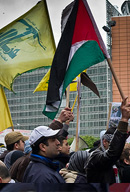Bi-Polar Europe

Last month, Western intelligence services uncovered a plot by Arab men holding European citizenship to carry out simultaneous shooting strikes in France, Germany, and Britain. The United States apparently thwarted the attacks in a targeted killing campaign using drone aircraft against suspected Taliban- and al-Qaeda-backed terrorists along the Pakistan-Afghan border.
But the danger posed by radicalized Muslims in Europe is hardly diminished. Dozens of German, Dutch, French, and British Islamists are presently undergoing military training in Pakistan and Afghanistan. They hope to replicate the example set by their predecessors in such actions as the 2004 Madrid train bombings that killed 191 and the July 2005 London Underground bombings that killed 56. Numerous other plots have been frustrated by security forces before they could be carried out. Still others—a second try against London's transport system, an attempt to blow up Glasgow's airport terminal—have failed only through luck or chance.
Europe's heightened state of alert, the long security lines at airports, the bomb-sniffing dogs at railroad stations—all these precautionary measures have fostered an atmosphere of frustration and intimidation. The result? Tolerance for Islamist "values" is in decline. In the UK, a majority of people associate Islam with terrorism and the repression of women. Across the political spectrum, there is widespread support for banning the burqa. In one recent poll, 74 percent of Spanish citizens agreed that a "clash of civilizations" was under way. In France, only 45 percent said they believed the country's Muslims were loyal.
But there is one glaring anomaly in the widespread turn against Islamist bullying: an exemption has been carved out for Palestinians. In the European mind, both popular and governmental, the Islamist crusade against Israel is above reproach.
Thus, whatever their qualms about Islamism and Arab extremism at home, the socialist government of Spain and the center-Right government of France collaborate within the European Union on behalf of a Palestinian Authority that, partly on Islamic grounds, rejects Israel's right to exist as a Jewish state. Although Nicolas Sarkozy's domestic opponents have labeled him pro-Israel, one would be hard-pressed to say where his positions differ from those articulated by PA President Mahmoud Abbas.
Over the summer, France symbolically upgraded its diplomatic recognition of the Palestinian delegation in Paris. Madrid and Paris have jointly spearheaded efforts for EU recognition of Palestinian statehood—regardless of the outcome of negotiations between Israel and the PA. The situation is little better in the UK, where the new Conservative-led government has embraced the Foreign Office's customary chilly outlook toward Israel, demanding a complete lifting of the quarantine against Hamas-controlled Gaza and characterizing housing construction anywhere over the Green Line as "a major barrier" to peace.
Public opinion has likewise shown no discernible backlash against Palestinian violence and aggression. The latest poll conducted by the Palestinian Center for Policy and Survey Research garnered considerable attention in Europe for its finding that most Palestinian Arabs oppose negotiations with Israel unless the settlement construction freeze is extended. Considerably less attention has been drawn to another of the survey's findings: a majority of Palestinians approved the recent murders of two Israeli men and two women—one of whom was pregnant—notwithstanding the fact that talks between Israel and the Palestinian Authority were then getting under way.
Whence the disparity between European impatience with violent behavior by domestic Muslim extremists and indifference or forbearance toward Palestinian brutality against Israel? For one thing, Palestinian groups have tended lately to confine their aggression to the universally detested "settlers," and have decoupled the Palestinian issue from the overall Islamist agenda. Another factor is the European media campaign aimed at demonizing and de-legitimizing Israel, which appears to excuse even the most contemptible Palestinian behavior, including by Hamas, an offshoot of the Muslim Brotherhood.
Old-fashioned prejudice may also be part of the explanation. Three-quarters of all Spanish citizens surveyed in 2009 exhibited classic anti-Semitic tendencies, and more recent polls show large European majorities holding negative views of the Jewish state. One might think that, with Islamic terror continuing to reach European shores, as in last month's foiled plot, the continent would better appreciate Israel's role as front-line combatant in Europe's own war, and recognize that Israel's security was integral to its own. But, at least for the time being, Europe appears to remain firmly of two minds, increasingly intolerant of Islamist intimidation at home while insisting that Israel accommodate the same intimidation, and worse, in the Middle East.
The Israeli-Palestinian question falls neatly (not so neatly if you actually look at the facts) into that anti-colonialist leftist view which has been ascendent in European society after the late 60s. It lingers on in the view that Europeans wish to have of theirselves; that they are they have moved on from their blood soaked past, that racism isn't as bad there as it is in the U.S., that multiculturalism is practiced in Europe, in short, that they've learned their lessons and that their societies are superior to that of the U.S.. Of course, they are rapidly becoming disabused of certain aspects of this; xenophobia is on the rise across Europe, but it will take more time for the vestiges of this worldview to be cast off into the dustbin of history.
That's the bottom line. Jew hatred has flourished in Europe for centuries, and many Jews have stuck their heads in the sand not wanting to stand up for themselves for fear of exacerbating the situation.
If "Never Again" has any meaning, and I know to some Jews it does not, then stand up and fight by any means possible.
Comments are closed for this article.




